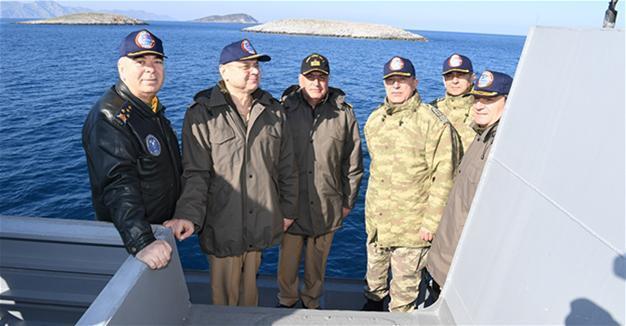Turkish FM says Greece should not try Turkey’s patience, calls counterpart ‘spoiled child’
ANTALYA

Foreign Minister Mevlüt Çavuşoğlu has warned Greece not to try the country’s patience amid fresh tension between the two countries over remarks by Greek Foreign Minister Nicos Kotzias, which he described as “provocative.”
“Basically, we have many similar sides [with Greece] but ultimately, Greece should not allow one spoiled child to overshadow all of these,” he said Feb. 26.
“We do not need a show of strength. They are the ones who know best what a Turkish soldier can do when appropriate. The government knows it best. Let them tell it to that spoiled child precisely. They should not try our patience,” Çavuşoğlu said after a visit to the Antalya Journalists Association.
Çavuşoğlu said the Greek government was also disturbed by Kotzias, whom he called a spoiled child.
Çavuşoğlu’s remarks follow the latest row between himself and his Greek counterpart, who previously criticized the Turkish top brass’ visit to the long-disputed Kardak islets in the Aegean Sea.
“Kotzias is unfortunately talking provocatively. He said ‘The Turkish Chief of Staff could not step on Kardak even if he wanted.’ If his duty required him to, he would have done it. Let’s not forget that we set foot in places we have to. Our stance on the Kardak issue is clear,” Çavuşoğlu told state-run Anadolu Agency on Feb. 25.
He also advised Kotzias to closely follow developments from Turkey in its fight against terror inside the country and abroad and not to mistake the abilities of the Turkish Armed Forces.
The islets, named Imia in Greek and Kardak in Turkish, are two small uninhabited rocks in the Aegean Sea, situated between the Greek island chain of the Dodecanese and the southwestern mainland coast of Turkey.
The two countries nearly went to war over the islets in 1996 in an escalation that resulted in both sides landing soldiers on an islet each.
On Jan. 29, Akar, accompanied by the force commanders, paid a visit to the islets amid fresh tension between Turkey and Greece over the latter’s refusal to extradite coup plotter soldiers due to reports of human rights abuses in Turkey.
The minister also refuted claims that Ankara wanted to benefit from Athens’ economic weakness, noting that the country encouraged millions of Turks to visit Greece every year and also limited its activities in the Aegean for years despite all kinds of provocation.
When asked about Athens’ refusal to extradite eight former soldiers who were allegedly involved in the July 2016 coup attempt, Çavuşoğlu said it was not in line with friendly relations.
“Greece preventing the traitors from being prosecuted for their crimes is not in line with good-neighborly and friendly relations,” he said.
“Unfortunately this attitude is no surprise to us. The head of the PKK [outlawed Kurdistan Workers’ Party], who is now in prison, was hidden by Greece, too,” he said, referring to the jailed PKK leader, Abdullah Öcalan, who was caught and imprisoned in 1999.
The number of Turkish citizens who have illegally entered Greece since the attempted takeover now stands at 100, including the eight ex-soldiers who fled to the country in a stolen helicopter hours after orchestrating the coup and requested asylum.
Ankara has repeatedly requested the extradition of the eight men, promising they would get fair trials upon return. However, the Greek Supreme Court ruled against their extradition in January.
 Foreign Minister Mevlüt Çavuşoğlu has warned Greece not to try the country’s patience amid fresh tension between the two countries over remarks by Greek Foreign Minister Nicos Kotzias, which he described as “provocative.”
Foreign Minister Mevlüt Çavuşoğlu has warned Greece not to try the country’s patience amid fresh tension between the two countries over remarks by Greek Foreign Minister Nicos Kotzias, which he described as “provocative.”